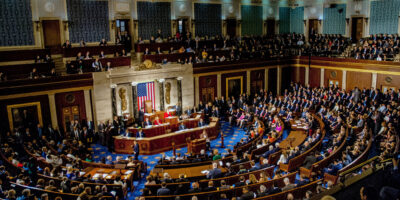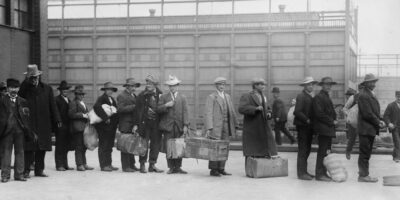Exit Scans Are Here
It happened again. I was just about to board an international flight leaving out of Atlanta. A US marshal stood in the path. He and an assistant had a machine and a pad with footprint decals. I was instructed to stand there. A machine scanned my face, found just the right frame, and snapped a picture. I expressed some puzzlement. The officer tried to address my concern: “It’s a free picture for you!” We laughed together because that’s what you do when you have some vague sense that a government official is standing in the way of you leaving your own country.
It’s the second time this has happened to me. Keep in mind that this is happened after the security clearance for getting a passport in the first place, after the identity match at the kiosk, after I was admitted to the security line following a check of my boarding pass, after the TSA did a thorough check and all my bags and person were carefully scanned, and after my ticket had already been verified at the gate. I was about the get on the plane, and yet, once again, I was subjected to another check. At any stage, I could have been refused the right to leave.
Most of the security regime at the airport seems to be about the safety of the airline itself, practices that can be chalked up as merely precautionary. But this final exit scan had a different feel. It was not about the airline. It was not about stopping terrorism and other mischief. It is purely about the possibility that the right of a person to exit could be denied for any reason the government happens to dream up. That’ how it seemed to me, in any case.
The last time this happened, I questioned a passport and customs official about the practice. He said it was not a program within his domain. These new exit scans are run by the US Marshals. However, he added, it was his agency’s ambition to have the same controls over exiting the country as the US has over entering the country. Coming and going. It was all the same to him. I resisted the temptation to say something about the problem of a prison state that curbs the right of its own citizens to leave. Echoes of East Germany and North Korea right there. I spared him my ideological rantings.
Here is the problem with a government policy concerning migration. Immigration control is accompanied by emigration control as well, in addition to the tracking of citizens within their own country. Just last week, Reason reported that Immigration and Customs Enforcement (ICE) is asking for full access to all data that the FBI and other government agencies already collect on American citizens. Why would they need it? “This could prove useful to both of the agency’s components: Homeland Security Investigations (HSI), which investigates transnational crimes, including drug trafficking, money laundering, cybercrimes, and arms trafficking; and Enforcement and Removal Operations (ERO), which arrests and detains undocumented immigrants.”
We tend to think that the popular reasoning behind immigration restriction is the government’s reason also. That is not the case. Government sees these rules as ways to tighten its rule over its subjects.
Modern immigration control began even before there was such a thing as passports, and the target was Chinese immigration and the reason was eugenic. The ruling class believed that the racial stock of Americans could be destroyed by intermixing with such foreign peoples. This way of thinking was expanded over the decades, culminating in the immigration laws of 1924 that specifically singled out for exclusion Jews, Southern Italians, and anyone regarded as “Slavic.” These groups were seen as potentially poisoning the genetic stock of the American citizenry. Understanding this is crucial for realizing why the Holocaust came down as it did: Jews found themselves landlocked in their own countries, unable to find a way out.
It’s a pathetic and evil history here, one that is rarely spoken about these days, but it is impossible to deny. The drive to control immigration is rooted in the search for ever more ways to control the choices and behaviors of American citizens. It is rooted in the government’s presumed control over the demographic makeup of the country it rules. You cannot hire whom you want from where they hailed. You cannot sponsor a foreigner to come here, live in your house, to attend a school to which he or she has been admitted. You do not have that freedom. Lacking that freedom to associate with people outside the borders, your freedom to associate within the borders is compromised as well.
And think about this too. If government is in charge of the demographic makeup of a country, why can it not also justly regulate birth, perhaps limit who can procreate and how often? This is, after all, a major reason why marriage licenses took hold in this country. It was all about giving bureaucrats the first right of refusal about who was entitled to call themselves a family.
The popular support for closed borders imagines that government will use its powers only against people we don’t like. But once granted such power comes to be used in ways that fit with government’s core ambition, which is really about surveilling, regulating, and pillaging its own citizens.
An example was presented to us a few weeks ago. A sting operation against 7-11 stores in Southern California resulted in hundreds of arrests because stores were using undocumented workers. No one was hurt by this practice. The enterprises got low-priced labor, poor workers got jobs, and customers were able to enjoy the convenience that comes with a thriving network of these stores. But the bureaucrats disagreed. Only they can decide who can and cannot work. So immigration authorities shut it all down. They can do the same in any community in the US today. They could be coming to your community, shutting down your access to stores and talents on bureaucratic whim.
Controls on your right to travel outside the country are an easy step. But think of it. If you are prevented from leaving your own nation, what kind of nation is it? Prison state comes to mind. So many people I know have come to favor closed borders because they somehow think there is a connection between big government and heterogeneous populations. What they do not seem to understand is that closed borders themselves are big government programs, one that will always come back to bite its own advocates.









